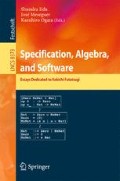Abstract
A synchronous observer is an adjunct to a system model that monitors its state variables and raises a signal flag when some condition is satisfied. Synchronous observers provide an alternative to temporal logic as a means to specify safety properties but have the advantage that they are expressed in the same notation as the system model—and thereby lower the mental hurdle to effective use of model checking and other techniques for automated analysis of system models. Model checkers that do use temporal logic can nonetheless employ synchronous observers by checking for properties such as “never(flag raised).”
The use of synchronous observers to specify properties is well-known; rather less well-known is that they can be used to specify assumptions and axioms, to constrain models, and to specify test cases. The idea underlying these applications is that the basic model generates more behaviors than are desired, the synchronous observer recognizes those that are interesting, and the model checker is constrained to just the interesting cases. The efficiency in this approach is that it is usually much easier to write recognizers than generators.
The paper describes and illustrates several applications of synchronous observers.
Access this chapter
Tax calculation will be finalised at checkout
Purchases are for personal use only
Preview
Unable to display preview. Download preview PDF.
References
Halbwachs, N., Lagnier, F., Ratel, C.: Programming and verifying real-time systems by means of the synchronous data-flow language LUSTRE. IEEE Transactions on Software Engineering 18, 785–793 (1992)
Halbwachs, N., Lagnier, F., Raymond, P.: Synchronous observers and the verification of reactive systems. In: Algebraic Methodology and Software Technology (AMAST 1993). Workshops in Computing, pp. 83–96. Springer, Enschede (1994)
Dwyer, M.B., Avrunin, G.S., Corbett, J.C.: Patterns in property specifications for finite-state verification. In: International Conference on Software Engineering, pp. 411–420. IEEE Computer Society, Los Angeles (1999)
SAL home page, http://sal.csl.sri.com/
McMillan, K.L.: Circular compositional reasoning about liveness. In: Pierre, L., Kropf, T. (eds.) Advances in Hardware Design and Verification: IFIP WG10.5 International Conference on Correct Hardware Design and Verification Methods (CHARME 1999). LNCS, vol. 1703, pp. 342–346. Springer, Heidelberg (1999)
Rushby, J.: Formal verification of McMillan’s compositional assume-guarantee rule. Technical report, Computer Science Laboratory, SRI International, Menlo Park, CA (2001)
Kupferman, O., Vardi, M.Y.: Vacuity detection in temporal model checking. International Journal on Software Tools for Technology Transfer 4, 224–233 (2003)
Sankaranarayanan, S., Tiwari, A.: Relational abstractions for continuous and hybrid systems. In: Gopalakrishnan, G., Qadeer, S. (eds.) CAV 2011. LNCS, vol. 6806, pp. 686–702. Springer, Heidelberg (2011)
Tiwari, A.: HybridSAL relational abstracter. In: Madhusudan, P., Seshia, S.A. (eds.) CAV 2012. LNCS, vol. 7358, pp. 725–731. Springer, Heidelberg (2012)
Bass, E.J., Feigh, K.M., Gunter, E., Rushby, J.: Formal modeling and analysis for interactive hybrid systems. In: Fourth International Workshop on Formal Methods for Interactive Systems: FMIS 2011, Limerick, Ireland. Electronic Communications of the EASST, vol. 45 (2011)
Burch, J.R., Clarke, E.M., McMillan, K.L., Dill, D.L., Hwang, L.J.: Symbolic model checking: 1020 states and beyond. Information and Computation 98, 142–170 (1992)
de Moura, L., Rueß, H.: Lemmas on demand for satisfiability solvers. In: Proceedings of the Fifth International Symposium on the Theory and Applications of Satisfiability Testing (SAT 2002), Cincinnati, OH (2002)
de Moura, L., Rueß, H., Sorea, M.: Lazy theorem proving for bounded model checking over infinite domains. In: Voronkov, A. (ed.) CADE 2002. LNCS (LNAI), vol. 2392, pp. 438–455. Springer, Heidelberg (2002)
Rushby, J.: New challenges in certification for aircraft software. In: Baruah, S., Fischmeister, S. (eds.) Proceedings of the Ninth ACM International Conference On Embedded Software: EMSOFT, pp. 211–218. Association for Computing Machinery, Taipei (2011)
Rushby, J.: A safety-case approach for certifying adaptive systems. In: AIAA Infotech@Aerospace Conference, Seattle, WA. American Institute of Aeronautics and Astronautics, AIAA paper 2009-1992 (2009)
Schlichting, R.D., Schneider, F.B.: Fail-stop processors: An approach to designing fault-tolerant computing systems. ACM Transactions on Computer Systems 1, 222–238 (1983)
Rushby, J.: Composing safe systems. In: Arbab, F., Ölveczky, P.C. (eds.) FACS 2011. LNCS, vol. 7253, pp. 3–11. Springer, Heidelberg (2012)
Gargantini, A., Heitmeyer, C.: Using model checking to generate tests from requirements specifications. In: Nierstrasz, O., Lemoine, M. (eds.) ESEC/FSE 1999. LNCS, vol. 1687, pp. 146–162. Springer, Heidelberg (1999)
Hamon, G., de Moura, L., Rushby, J.: Generating efficient test sets with a model checker. In: 2nd International Conference on Software Engineering and Formal Methods (SEFM), Beijing, China, pp. 261–270. IEEE Computer Society (2004)
Hamon, G., de Moura, L., Rushby, J.: Automated test generation with SAL. Technical note, Computer Science Laboratory, SRI International, Menlo Park, CA (2005), http://www.csl.sri.com/users/rushby/abstracts/sal-atg
IEEE Standard 1850–2010: Property Specification Language, PSL (2010)
IEEE Standard 1800–2012: SystemVerilog—Unified Hardware Design, Specification, and Verification Language (2012)
Littlewood, B., Rushby, J.: Reasoning about the reliability of diverse two-channel systems in which one channel is “possibly perfect”. IEEE Transactions on Software Engineering 38, 1178–1194 (2012)
Rushby, J.: The versatile synchronous observer (abstract only). In: Gheyi, R., Naumann, D. (eds.) SBMF 2012. LNCS, vol. 7498, p. 1. Springer, Heidelberg (2012)
Author information
Authors and Affiliations
Editor information
Editors and Affiliations
Rights and permissions
Copyright information
© 2014 Springer-Verlag Berlin Heidelberg
About this chapter
Cite this chapter
Rushby, J. (2014). The Versatile Synchronous Observer. In: Iida, S., Meseguer, J., Ogata, K. (eds) Specification, Algebra, and Software. Lecture Notes in Computer Science, vol 8373. Springer, Berlin, Heidelberg. https://doi.org/10.1007/978-3-642-54624-2_6
Download citation
DOI: https://doi.org/10.1007/978-3-642-54624-2_6
Publisher Name: Springer, Berlin, Heidelberg
Print ISBN: 978-3-642-54623-5
Online ISBN: 978-3-642-54624-2
eBook Packages: Computer ScienceComputer Science (R0)

